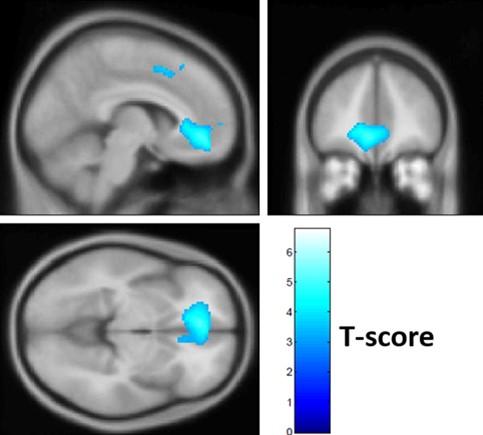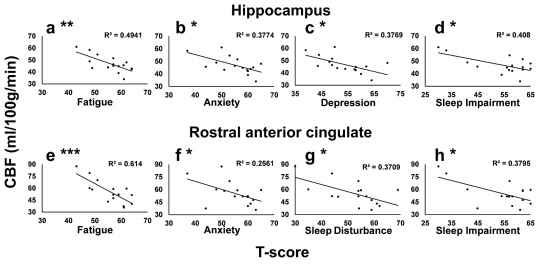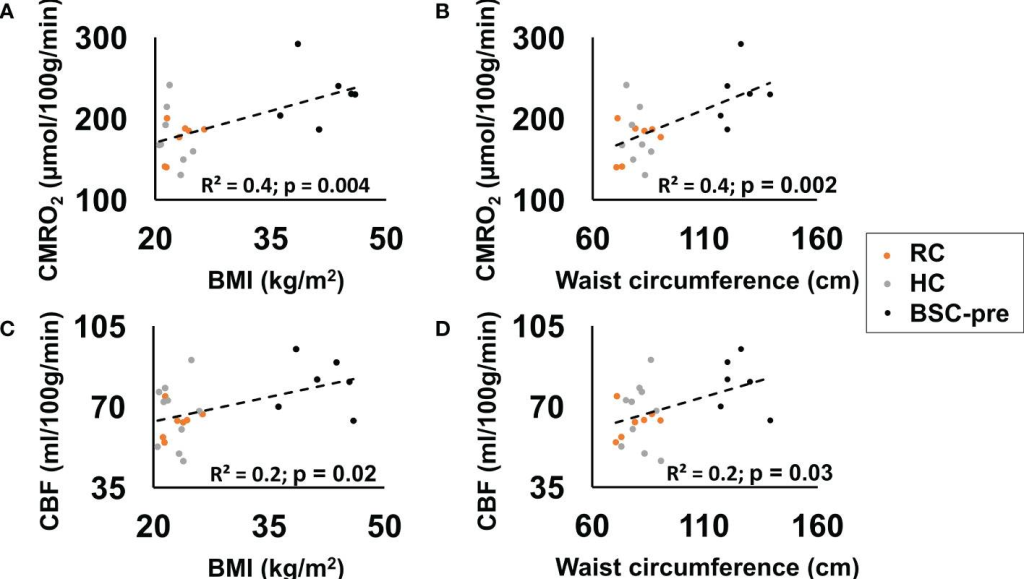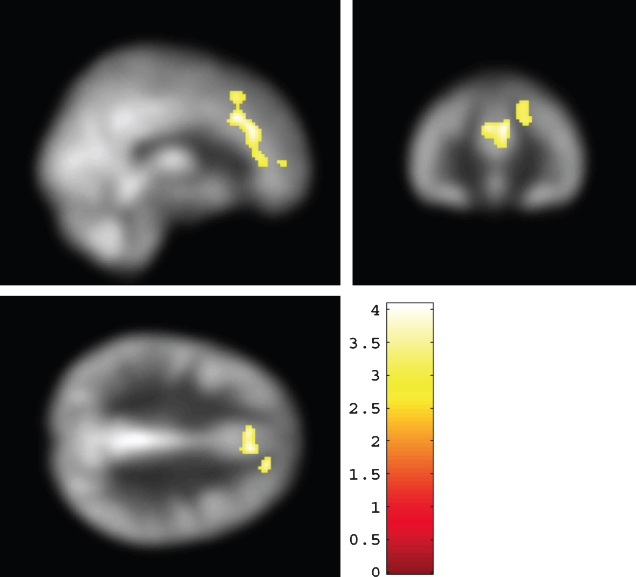Active Studies
Aerobic Exercise Effects on Cerebrovascular Reactivity
Amnestic mild cognitive impairment is considered a precursor to Alzheimer's disease. Recent studies have explored the potential of aerobic exercise as a non-pharmacological intervention to slow cognitive decline in aMCI participants. Previously, only short-term effects of aerobic exercise were studied and how it impacted cerebrovascular reactivity and cognitive function. This study will assess the long-term impact of aerobic exercise on neurocognitive function, brain vasculature, and cognitive performance in aMCI participants.
Grants and Funding: R01 AG033106
 Voxel-wise two sample t-test results of significant differences in cerebral vascular reactivity (CVR) in mild cognitively impaired participants performing aerobic exercise.
Voxel-wise two sample t-test results of significant differences in cerebral vascular reactivity (CVR) in mild cognitively impaired participants performing aerobic exercise. Diabetes and Treatment with GLP-1 Receptor Agonists
Our research focuses on assessing the impact of novel dual GIP and GLP-1 agonist on cognitive function and brain health in individuals with diabetes and obesity. Obesity is a leading factor in conditions such as Type 2 Diabetes, cardiovascular disease, and Alzheimer's disease and related dementias (ADRD). While the GIP and GLP-1 medicines have shown to improve blood glucose and body composition, its effect on cognitive function are less understood. In our study, we will evaluate how weight loss induced by GIP and GLP-1 therapy impacts cognition, brain vascular function, and metabolic health over 12 months. Our data from bariatric surgery induced weight loss shows a 13% total body weight loss in 14 weeks, associated with a 20% improvement in cognitive function, reduced cerebral oxygen metabolism, and improved brain efficiency. We aim to further explore the effects of diabetes and obesity treatment with GIP and GLP-1RA in the reduction of risk for ADRD.
Hearing Deficits
Our research aims to explore the impact of hearing aids on cognitive, auditory, and brain function in individuals with age-related hearing loss (ARHL). ARHL is a common, progressive condition linked to cognitive decline, yet many individuals delay seeking help for it. Over 12 months, we will monitor changes in cognitive performance, brain imaging, and auditory function in ARHL participants who will use hearing aids versus those who will not. The control group is of age and sex matched normal-hearing individuals. Baseline and follow-up data would assess how hearing aid usage affects neural processing, speech understanding, and cognitive function and how it impacts ADRD risk.
Previous Studies
Chronic TBI Effects on Cerebral Blood Flow
This study assessed cerebral blood flow (CBF) and its association with self-reported symptoms in individuals with chronic traumatic brain injury (TBI). Sixteen participants with mild to severe TBI and ongoing symptoms, 6 to 72 months post-injury, were compared to 16 age and sex-matched healthy controls. Using Pseudo-continuous Arterial Spin Labeling (PCASL) and T1-weighted imaging, regional CBF and brain volume were evaluated. Global CBF and brain volumes were similar between groups. Lower CBF was observed in the thalamus, hippocampus, left caudate, and left amygdala in the TBI group. Hippocampal, parahippocampal, and rostral anterior cingulate CBF were negatively associated with self-reported symptoms of anger, anxiety, depression, fatigue, and sleep disturbances.
Grants and Funding: R01 HL102457/HL/NHLBI
 Negative correlation between hippocampus ROI CBF (a – d) and TBI-related symptoms of (a) Fatigue (p = 0.002), (b) Anxiety (p = 0.01), (c) Depression (p = 0.01), and (d) Sleep Impairment (p = 0.008) and negative correlation between rostral anterior cingulate cortex ROI CBF (e – h) and TBI-related symptoms of (e) Fatigue (p = 0.0003), (f) Anxiety (p = 0.045), (g) Sleep Disturbance (p = 0.01), and (h) Sleep Impairment (p = 0.01). TBI-related symptoms are reported as T-scores; significant correlations are denoted as: * p < 0.05; ** p < 0.005; *** p < 0.0005
Negative correlation between hippocampus ROI CBF (a – d) and TBI-related symptoms of (a) Fatigue (p = 0.002), (b) Anxiety (p = 0.01), (c) Depression (p = 0.01), and (d) Sleep Impairment (p = 0.008) and negative correlation between rostral anterior cingulate cortex ROI CBF (e – h) and TBI-related symptoms of (e) Fatigue (p = 0.0003), (f) Anxiety (p = 0.045), (g) Sleep Disturbance (p = 0.01), and (h) Sleep Impairment (p = 0.01). TBI-related symptoms are reported as T-scores; significant correlations are denoted as: * p < 0.05; ** p < 0.005; *** p < 0.0005 Obesity and Weight Loss with Bariatric Surgery
This pilot study assessed cognition and cerebral metabolic rate of oxygen (CMRO2) consumption in individuals with severe obesity before and 2- and 14-weeks after sleeve gastrectomy bariatric surgery. Six participants with severe obesity and 10 age- and sex-matched healthy controls (HC) were en. MRI measured global CMRO2, and cognition was evaluated using the Integneuro testing battery. Two weeks after surgery, participants experienced a 5.4% weight loss, with a 15.8% improvement in cognition scores. After 14 weeks, weight loss reached 13.0%, with a 20.6% improvement in cognition, making their scores comparable to those of the HC group. Baseline CMRO2 was higher in participants with obesity compared to HC. At 14 weeks, CMRO2 decreased by 5.7% from baseline and was similar to that of HC. These results suggest that weight loss from sleeve gastrectomy may improve cognition and reduce CMRO2, warranting further investigation in larger studies.
Grants and Funding: UL1 TR001105/TR/NCATS
 CMRO2 (p=0.004) (A) and CBF (p=0.02) (C) correlated significantly with BMI (reference control - RC, healthy normal weight controls - HC, bariatric surgery candidates at the pre-surgery stage - BSC-pre). CMRO2 (p=0.002) (B) and CBF (p=0.03) (D) correlated significantly with waist 7circumference.
CMRO2 (p=0.004) (A) and CBF (p=0.02) (C) correlated significantly with BMI (reference control - RC, healthy normal weight controls - HC, bariatric surgery candidates at the pre-surgery stage - BSC-pre). CMRO2 (p=0.002) (B) and CBF (p=0.03) (D) correlated significantly with waist 7circumference. Brain Perfusion Change in aMCI
This study examined the impact of aerobic exercise (AE) on neurocognitive function in individuals with amnestic mild cognitive impairment (aMCI). Cerebral blood flow was measured using Pseudo-Continuous-Arterial-Spin-Labeling (PCASL) MRI. Thirty participants were divided into two groups: one performing AE and the other stretch training, over 12 months. The AE group showed significant improvements in cardiorespiratory fitness and memory, along with increased cerebral blood flow (CBF) in the anterior cingulate cortex. The CBF changes were linked to memory improvements. In contrast, AE reduced CBF in the posterior cingulate cortex. These findings suggest AE may benefit Alzheimer's disease prevention by redistributing blood flow in key brain regions.
Grants and Funding: R01 AG033106
 Voxel-wise regression results between changes in Logical Memory (LM) delayed recall scores and changes in cerebral blood flow (CBF) before and after aerobic exercise training. Improvement in LM delayed recall scores positively correlated with an increase in CBF in anterior cingulate cortex and medial frontal gyrus (BA6) (colored voxels). The significant voxels (family-wise-error corrected p < 0.05) were overlaid on CBF map in the MNI template space
Voxel-wise regression results between changes in Logical Memory (LM) delayed recall scores and changes in cerebral blood flow (CBF) before and after aerobic exercise training. Improvement in LM delayed recall scores positively correlated with an increase in CBF in anterior cingulate cortex and medial frontal gyrus (BA6) (colored voxels). The significant voxels (family-wise-error corrected p < 0.05) were overlaid on CBF map in the MNI template space